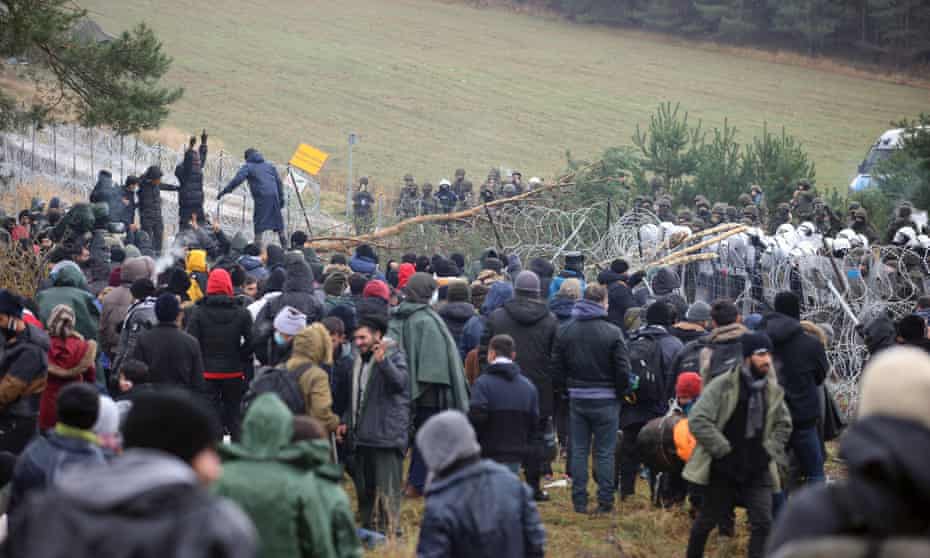
I presume those working at the New York Times think of themselves as “elites” — and so the opinions published by the paper reflect elitist thinking. Yet, a recent “guest essay” that takes a long, strategic view of the events at Belarusian-Polish border made me wonder: do our self-declared “elites” think?
After all, thinking is an on-going analytical process that, to be of any worth, has to reflect the latest empirical evidence. People whose positions do not change as the new evidence contradicting their old assumptions arrive, are dogmatists, not thinkers. By inflexibly sticking to their old views no matter what, they practice the very opposite of thinking,
The New York Times‘ essay strikes me as a textbook example of suchlike blind dogmatism that is impervious to empirical experience. Not that one does not feel for the unfortunates taken hostage by Lukashenko’s ploy to spite the EU by enticing people from the Middle East to use Belarus as a bridgehead to Europe, flooding the EU with the Middle Easterners in revenge for EU’s sanctions imposed on his regime. “It’s shocking to see. Children huddle over precariously built bonfires and parents hold babies to their chests while soldiers, behind thickets of razor wire, look on impassively.” One can hardly disagree. The scene is indeed shocking.
But what is also shocking is the suggested analysis of the root of the problem, and the suggested solution. “[Lukashenko] exploited a problem the European Union has fashioned for itself. For the past six years, it has tried to shut out migrants from poorer and conflict-ridden countries — through border walls, draconian policing and dubious deals with countries outside the bloc — in fear of the political effects of large-scale migration. …European officials use the language of moral superiority and humanitarianism without the policies to back it up, weakening their authority to call out countries such as Belarus and Russia. They should start redressing those double standards immediately. In the first instance, the European Commission must pressure Poland — wielding the threat, or even reality, of punishment — to allow humanitarian access to the border zone where necessary and to process asylum claims of people on its territory. That should be the first step in a new approach to migration, opening more legal pathways for work visas and refugee resettlement, while developing a functioning asylum system in which the burden is shared throughout the bloc.” So, per the self-styled elite that is the New York Times, the crisis is Europe’s fault; it should have just rolled over and let them in.
It is shocking that this could pass for thinking at the New York Times, since this long quote is obviously based on outdated assumptions — assumptions that completely ignore the experience gained since the million-strong exodus to the EU of Syrians and other Middle Easterners fleeing the misery of the civil war in 2015 — which was not a happy experience at all, accompanied as it was by crime and jihadism. Why has the EU “tried to shut out migrants from poorer and conflict-ridden countries,” per the New York Times? It does not tell, but apparently, not because of the new arrivals’ lack of desire to assimilate in the host countries; it is not because they sapped the welfare systems of the host countries, refusing to give up their old-country mores, but viewing Europe instead with the self-righteous intolerance of their home countries that is rooted in deep-seated feeling of superiority — nay, “truth” — of Islam.
Why can’t the New York Times explain to us why “Germany’s initial welcome soon gave way to harsh statements and newly fortified borders,” and why is it that “Poland came under no pressure from the union to open its border to the most vulnerable [but] instead enjoyed the bloc’s full support”? I suspect it is because no thinking is going on at the New York Times, no empirical experience challenging its dogmatic views.
If the self-declared elites of the New York Times thought, they would have answered those questions. At least, they would have seen those questions as relevant. But apparently they don’t. So let me suggest an answer: unlike the New York Times, the peoples in Europe did learn from their experience. The rednecks of the EU, unhappy with how the 2015 experiment worked (or rather, didn’t work) out, pressured their governments to not repeat it, having learned through the nose that goody-goody “multiculturalism” so dear to the New York Times’ heart does not work, that no good deed goes unpunished.
The tragic situation at the Polish border teaches us that people can learn. Yet the reaction in the New York Times to this situation tells us that the self-proclaimed “elites” learn nothing — that they shut their eyes to empirical evidence, blindly sticking to their ideological dogmas no matter what.
- Like
- Digg
- Tumblr
- VKontakte
- Buffer
- Love This
- Odnoklassniki
- Meneame
- Blogger
- Amazon
- Yahoo Mail
- Gmail
- AOL
- Newsvine
- HackerNews
- Evernote
- MySpace
- Mail.ru
- Viadeo
- Line
- Comments
- SMS
- Viber
- Telegram
- Subscribe
- Facebook Messenger
- Kakao
- LiveJournal
- Yammer
- Edgar
- Fintel
- Mix
- Instapaper
- Copy Link







